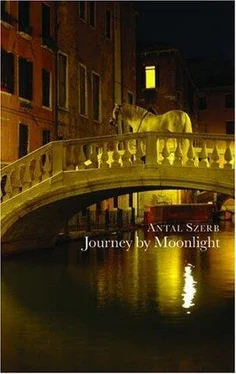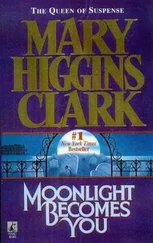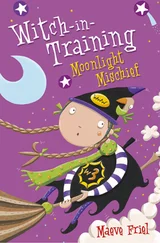“Do you really think so?”
Erzsi lowered her head.
“You’re right. I don’t really think so.”
“Why was I so frank?” The question gnawed at her. “Why did I give myself away, as I have to no-one else? It seems there’s still something between me and Zoltán. Some sort of intimacy, that can’t be wished away. You can’t undo four years of marriage. There’s no other person in the world I would have discussed Mihály with.”
“My time hasn’t yet come,” thought Zoltán. “She’s still in love with that oaf. With a bit of luck Mihály will mess it up in the fullness of time.”
“What news have you had of him?” he asked.
“Nothing. I only guess he’s in Italy. One of his friends is here, someone I also know, by the name of János Szepetneki. He tells me he’s tracking him closely and will soon know where he is, and what he’s doing.”
“How will he find out?”
“I don’t know. Szepetneki is a very unusual man.”
“Truly?” Zoltán raised his head and gazed at her steadily. Erzsi withstood the gaze defiantly.
“Truly. A very unusual man. The most unusual man I ever met. And then there’s a Persian here too … ”
Pataki dropped his head, and took a large mouthful of tea. “Which of the two was it? Or was it both? My God, my God, better to be dead … ”
The tête-à-tête did not last very much longer. Erzsi had some business, she didn’t say what.
“Where are you staying?” she asked absent-mindedly.
“At the Edward VII.”
“Well, goodbye, Zoltán. Really, it was very nice seeing you again. And … don’t worry, and don’t think about me,” she said quietly, with a sad smile.
That night Pataki took a little Parisienne back to the hotel. “After all, when you’re in Paris,” he thought, and was filled with unspeakable revulsion against the smelly little stranger snoring in the bed beside him.
In the morning, after she had gone and Pataki was up and beginning to shave, there was a knock at the door.
“ Entrez !”
A tall, too-elegantly dressed, sharp-featured man made his entrance.
“I’m looking for Mr Pataki, the Director. It’s important. A matter of great importance to him.”
“That’s me. With whom do I have the pleasure?”
“My name is János Szepetneki.”
V A porta inferi R erue, Domine,
animam eius.
OFFICIUM DEFUNCTORUM
NIGHT WAS FALLING. Slowly, with a slight dragging of the feet, Mihály trudged over the Tiber.
For some time now he had been living on the Gianicolo Hill, in a shabby little room Waldheim had discovered, where a scruffy crone cooked most of his meals, simple pasta asciutta , which Mihály supplemented with a bit of cheese and sometimes an orange. Despite its creaking antiquity it was much more the real thing than any hotel room. The furniture was ancient — real furniture, large and nobly proportioned, not the pseudo-furniture one finds in large hotels. Mihály would have been very fond of his room had its state of cleanliness and hygiene not constantly provoked the painful sense of having come down in the world. He even complained to Waldheim, who simply laughed and delivered lengthy and not very appetising lectures on his experiences in Greece and Albania.
Thus he came face to face with poverty. Now he really did have to ponder every centesimo before parting with it. He gave up drinking black coffee, and smoked cigarettes so foul he could take only a few at a time. His throat was permanently inflamed. And the thought was seldom from his mind that what money he had would soon run out. Waldheim was always assuring him that he would find a job. There were so many stupid old American women running about in Rome that one of them was sure to hire him as a secretary or tutor for her grand-children, or perhaps as a caretaker, a really cosy position that. But at present these American women existed entirely in Waldheim’s imagination, and besides, Mihály had a dread of any occupation he might equally find in Budapest.
Anyway, he already had two occupations, and between them they were quite enough for him. The first was, on Waldheim’s instructions, to ‘read up’ on everything Etruscan, to frequent libraries and museums, and listen every evening to the conversation of Waldheim and his current academic friends. Mihály did not for a moment feel anything of Waldheim’s immense, genuine enthusiasm for the subject, but he clung desperately to the routine of study for the slight relief it gave from the suffocating middle-class guilt which he still felt, so pointlessly, about his life of idleness. Mihály had never really liked work, but in his bourgeois years had applied himself obsessively because he loved the feeling at night of having done a good day’s worth. Moreover, study momentarily diverted his attention away from his second and more important occupation: waiting for a meeting with Éva.
He simply could not accept the possibility that he would never see her again. The day after that memorable night he had wandered round the city in a stupor, with no idea of what he wanted, though he later saw clearly that there was only one thing he could want, so far as the word ‘want’ had any meaning in the case. The academics had taught him that there are degrees of Being, and that only the Perfect was wholly, truly alive. The time he spent in quest of Éva had been more alive, far more truly caught up in reality, than all the months and years without her. However good or bad, however bound up with hideous anxiety and trouble, he knew that this was the life, and that without Éva there was no reality other than in thinking of her and waiting for her.
He was tired, oppressed with the sense of his own mortality, and he dragged his feet as if lame. Reaching the river bank he became aware of a feeling that he was being followed. But he dismissed it, persuading himself that it was just his nervous imagination.
However as he trudged through the alleyways of the Trastevere quarter the feeling became ever more insistent. A strong wind began to blow. There were far fewer people than usual about in the streets. “If someone is following me,” he thought, “I must get a glimpse of him,” and he turned round periodically to look. But people kept coming. “Perhaps someone is following me, and perhaps not.”
As he made his way up the narrow streets the feeling gradually became so insistent again that he decided not to turn left, up towards the hill, but to continue on through the Trastevere alleyways with the idea of waiting for the pursuer in some suitable place. He stopped outside a little tavern.
“If he wants to attack me,” he thought (in the Trastevere district this was not difficult to imagine) “here at least I can count on help. Someone’s bound to come out of the bar if I shout. But in any case I’ll wait and see.”
He stood outside the little inn and waited. More people came along, having followed him out of the alleys, but none took the slightest notice of him. They simply continued on their way. He was just about to move on when a man approached in the semidarkness, and Mihály instantly knew that this was he. With beating heart he realised that the man was making straight for him.
As the shape loomed closer he recognised János Szepetneki. In the whole episode the strangest thing, perhaps the only strange thing, was that he was not particularly surprised.
“Hello,” he said quietly.
“Hello, Mihály,” said Szepetneki, loudly and jovially. “I’m glad you decided to wait for me. This is just the place I wanted to take you. Well, come on in.”
They entered the little tavern, whose strongest feature, apart from the smell, was the darkness. The smell Mihály could tolerate. For some reason the smells of Italy did not bother his normally sensitive nostrils. In this particular smell there was something romantic, a hint of fatality. But the darkness he did not like. Szepetneki immediately shouted for a lamp. It was brought by a ravishing, distinctly slovenly Italian girl, shockingly thin, with flashing eyes and huge earrings. It appeared Szepetneki was an old acquaintance. He slapped her on the back, at which she smiled with her great white teeth and launched into a story in the Trastevere dialect, of which Mihály understood not a single word, though János, who, like all con-men, had a flair for languages, interjected skilfully. The girl brought wine, sat down at the table, and talked. János listened with delight, ignoring Mihály completely, or, at most, offering the occasional comment in Hungarian, such as:
Читать дальше












